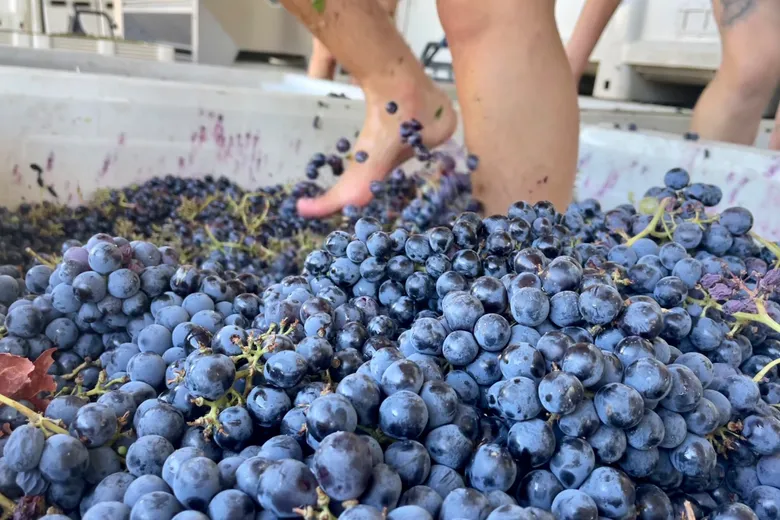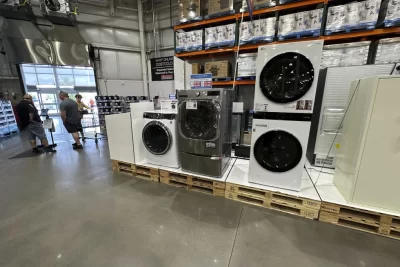
Wine made in ancient ways is gaining new fans.
Natural wine — which emphasizes sustainability and minimal processing — is seeing growing interest in the U.S even though overall wine consumption has been declining since 2015, according to IWSR Drinks Market Analysis, a research firm. While natural and other sustainable wines made up less than 1% of sales in 2021, demand was rising faster than the wine category as a whole, according to alcohol delivery site Drizly.
Generally, natural wine is made with hand-picked organic grapes that haven’t been sprayed with herbicides or pesticides. Once they’re crushed — sometimes by foot, the way they were crushed by ancient Romans — they are naturally fermented with no added water, yeast or other ingredients. Some natural winemakers add sulfites, a chemical found naturally in grapes, as a preservative; others don’t. Some filter their wines; others leave them cloudy and full of sediment.
The result is wines that are earthy, savory and less predictable than many of the wines churned out by big producers.
“The first time you taste it, you can tell it’s alive,” said John Keller, the owner and winemaker at Neu Cellars in Northern Michigan.
“Natural just sounds good, but conventional wine is pretty natural too,” said Anita Oberholster, a professor in the Department of Viticulture and Enology at the University of California, Davis. “If the idea of natural wine is going to grow, we should do research on it and define it.”
Keller, who has a degree in biochemistry, started out working for a big winemaker in California. But he was disillusioned by all the chemical manipulation that went into making each bottle consistent. There are dozens of additives regularly used in the wine industry, including gelatin, oak dust and egg whites.
In 2019, Keller and his father opened Neu Cellars to focus on making natural wines. Last year, they produced 3,000 bottles.
Natural winemaking is “100% scary,” Keller said. He only gets to practice once a year and he can’t fall back on additives if things go wrong.
“It’s how life happens. You can’t really control it. You just have to give it the best conditions for the best outcome you can get,” he said.
Natural wine is not so much a fad as a return to tradition, said Erin Coburn, the owner of Minimo, a natural wine bar in Oakland, California. In some countries, like Georgia, winemakers never stopped making natural wine; they still ferment grapes in the egg-shaped clay pots they’ve used for thousands of years.
But others say the line between natural and conventional wines is a very thin one, especially for higher-end wines made with good grapes.
Many additives like yeast — which aids fermentation — are natural substances that are found in vineyards already, Oberholster said. And many conventional wines are made without additives.
Some in the industry would like to see standards adopted for natural wine. That’s what happened in France, where the wine industry approved the “vin method nature” label and certification process in 2020. More than 430 vintages have used the label since then, according to the Union for the Defense of Natural Wines.
Brian Gelb, the vice president of wine for Total Wine, a retail chain with 257 U.S. stores, has been adding natural wines to store shelves in the last two years to meet growing demand. But he isn’t sure how much of Total Wine’s inventory was already considered “natural.”
“I would just like to have a consistent set of terms and phrases that can be universally understood,” Gelb said.
Anthony Zhang, the co-founder and CEO of Vinovest, a wine investment company, said some wine brands are taking advantage of the lack of standards and using natural imagery without being transparent about how they define “natural.”’
That can mislead consumers, who generally pay more for natural wines because they are made by smaller producers. Absentee Red, a natural California red blend, costs around $26 per bottle. Vivino, an online wine merchant, says similar bottles of conventional wine start around $14.
Still, winemakers don’t always welcome standards, which come with significant costs and rules. Keller uses organic grapes but says he can’t justify the cost of repeated inspections for an organic label.
Cheryl Stanley, a senior lecturer of food and beverage management at Cornell University, said standardization would be a challenge since there are so many perceptions of what makes wine “natural.” She questions if any wine is truly natural; after all, there is human intervention at every step, from how grapes are trellised to the date they are harvested.
Greater transparency on wine labels could be coming soon. Starting in December, wines sold in the European Union will have to carry ingredient labels and nutrition information. Oberholster expects the U.S. to adopt ingredient labels in the next few years as well, which would make it easier to see which wines were made without additives.
Pax Mahle, the proprietor and winemaker at Pax Wine Cellars in Sebastapol, California, is devoted to natural winemaking; he even crushes his grapes by foot. But he wants the freedom to add a little sugar or acid or sulfur to those grapes if he needs to, and he filters some of his white wines to make them taste cleaner and fresher.
“I think that the natural wine movement was never about these absolutes,” Mahle said. “I don’t fall into this belief that if you add sulfur you’re kicked out of the clubhouse. I think you should be kicked out of the clubhouse for making bad wine.”






